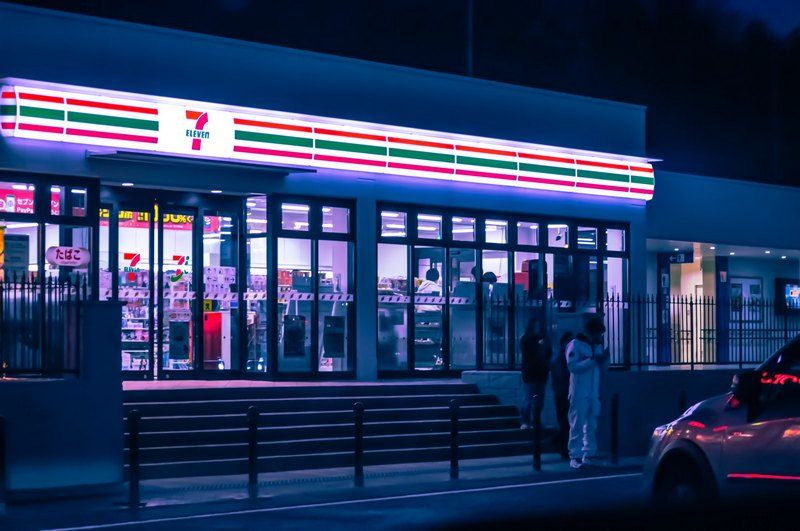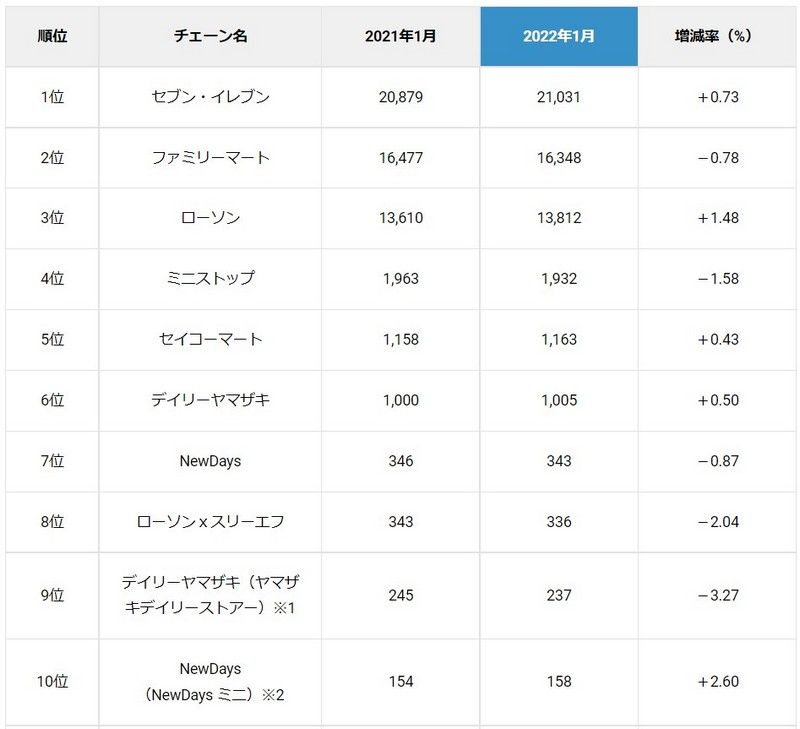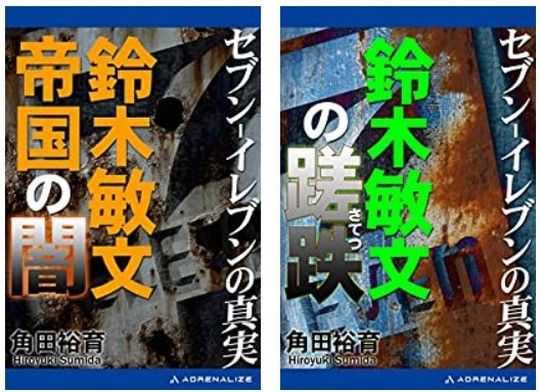The bitterness of 7-11 franchise stores in Japan
Nicknamed "Xiao Qi" or "Seven" in Taiwan, I think everyone should understand that 7-ᴇʟᴇᴠᴇn refers to convenience stores. So in Japan, how do people nickname it? It is said that different regions have different nicknames. When Japan is cut in half, about 40% of people in East Japan are called "7 (セブン)", and about 60% of people in Western Japan are called "7-11 (セブンイレブン)". Other names are "セブイレ (SeBuIRe)", "ブンブン (BunBun)"... (Sorry, I don't know how to translate other names into Chinese, in short, just change the pattern to shorten the full name 🤣)

When it comes to "Little Seven", it is impossible not to mention Toshifumi Suzuki , who introduced the business model of convenience stores from the United States to Japan and carried it forward. Some people praised him as the "father of 7-11" and even rose to "the god of retail".
Born in 1932, he first worked in the publishing industry after graduating from university. At the age of 31 (1963), he transferred to Ito-Yokado , and it took only 8 years to be promoted to the director (director) of this listed company. Three years later, in 1974, the first 7-11 store in Japan was opened in Koto-ku, Tokyo , against the crowd, leading only a dozen newbies. The following year, in Fukushima Prefecture, it pioneered the retail industry and opened a 24-hour business model. In 1978, he became the president of 7-11 Japan. In 1991, 7-11's American parent company went bankrupt. At this time, Suzuki's strength was enough to buy the parent company and obtain all the rights of 7-11. In the following year, he began to serve as the president of Ito-Yokado. In 2003, he became the chairman of the group company until he handed over the actual management power in 2016 and became an honorary consultant. In his half-century-long career as an office worker, he has been a "dictator" in the company for nearly 40 years.
In 2016, with the retirement of President Suzuki as the dividing line, during his reign, he liked to use people from the police or the Self-Defense Forces as head office cadres, squeezing franchise stores with high pressure. Since his retirement, 7-Eleven has gradually eased restrictions in an attempt to improve relations with franchisees.
Shorten business hours
The headquarters at that time had strict regulations, including not shortening business hours without authorization, and not allowing them to sell at a reduced price. However, in 2019, the franchise owner of the "7-11 Higashi-Osaka Minami Kosaka Store" in Higashi-Osaka City, Osaka Prefecture, Matsumoto Miyoshi , decided to shorten the business hours on his own accord when he could not reach a consensus with the headquarters due to insufficient manpower. At the end of the same year, the headquarters terminated the franchise contract on the grounds that Matsumoto’s franchisee rudely dealt with customers. In January 2020, Matsumoto was required to hand over the store and filed a lawsuit. On June 23, 2022, the Osaka District Court ruled that Matsumoto lost the case, and 7-11 could unilaterally terminate the franchise contract, and Matsumoto decided to continue the appeal. Historically known as "The Rebellion of the Former Store Owner".
Only one franchise leader sued 7-11, and he lost the lawsuit, which should have done little harm to 7-11. However, the news reports were enthusiastic and the public was in an uproar, which alarmed government units such as the Ministry of Economy, Trade and Industry and the Fair Quotation Committee . In June 2019, the Ministry of Labour established a "review meeting" to conduct an inquiry and investigation on franchise owners of convenience stores. The Public Procurement Commission also stated that forcing 24-hour business operations is likely to violate the monopoly prohibition law.
Criticisms of public opinion and the government’s moves have softened the attitude of the headquarters of various convenience stores. On October 7-11, 2019, regulations to shorten business hours were announced. By the end of February 2022, 5% of all franchised stores and about 1,000 stores implemented shortened business hours. . LAWSON was implemented in only 40 stores at the end of 2019, and about 440 stores have shortened business hours by July 1, 2022.

The problem of selling at a reduced price
Before 2009, the 7-11 headquarters had a very tough attitude. As long as any franchise store dared to cut prices without authorization to sell the products that were about to expire, the headquarters immediately unilaterally terminated the franchise relationship by violating the contract. This behavior was investigated by the Fair Citation Commission and confirmed that it violated the exclusive prohibition law, and since then, it can no longer be used as an excuse to terminate the franchise relationship. However, the 7-11 headquarters said to the outside world that it abide by the law, and secretly obstructed the price reduction behavior of franchise stores with small actions. For example, intentionally not informing all franchisees that the headquarters has agreed to allow price reductions, and the operational procedures for price reductions are extremely complicated.
It was not until June 2019 that the Ministry of Industry and Trade established a "review meeting" that 7-11 introduced a price reduction system for all stores. Consumers who buy food that is about to expire can get an additional 5% of 7-11 points. (It's not a direct discount... It's a master who doesn't want to suffer!)
share ratio problem
The share ratio between the headquarters and the franchise stores, the general practice, the total revenue of the store - the cost of purchasing goods = the distribution gold / gross profit (shangshanghao profit), and then handed over to the headquarters in a certain proportion. And 7-11's most mainstream form of contract, the turnover ratio is about 60%, which is higher than that of its peers, and even the higher the profit, the higher the turnover ratio.
The longer the franchise period is, there will be discount subsidies for the proportion of stores that have been turned in. If the franchise owner has 2 stores and closes 1 store that has been open for a long time, the discount subsidy will be cancelled, and the profit of the franchise owner will decrease.
It is not easy for a store that has been open for a long time to create a new source of revenue, and even if franchise owners want to control costs, under this franchise system, it is more difficult to save costs than revenue. The most common method is to reduce personnel costs, reduce the number of employees or working hours, and increase the owner's own working hours to compensate for the shortage of manpower. As mentioned earlier, the franchise owner's desire to shorten the business hours comes from this.
Loss cost burden problem
Convenience store franchisees must purchase goods from the headquarters, and everyone is happy to be able to sell all the goods. However, the taste period of fresh food is usually very short, and the food whose consumption period is about to expire must be destroyed. This part of the cost loss is called Loss . In 7-11, 15% of the cost of Loss is borne by the headquarters and 85% of the franchise owner. According to statistics, the average monthly loss cost of a convenience store is 600,000 yen, and stores with more Loss may double to 1.2 million yen. Some shopkeepers feel that it is too wasteful to discard and destroy edible food, and they can’t finish the food even if they are distributed to their own shopkeepers, so they have to eat it by themselves. Everyone is getting fat...
Epilogue
In recent years, Japan's convenience store chains have been in a state of three-strong status, but in the early days, they were actually dominant, that is, 7-11 dominated the industry, and their long-term leading position has also relatively contributed to the dictatorship of the former chairman of Suzuki. In fact, the black history of 7-11 is not only the above, there are more insider stories that have been silently dealt with. Friends who are interested in going deeper can find a book like this to read "セブン-イレブンの真実". The author of the book interviewed franchisees to obtain first-hand information, as well as how the franchisees organized the main union in the past to protect their own rights and interests. But it was divided and disintegrated by the headquarters.

So, why are there so many people who want to join the 7-11? In the past when Japan was prosperous, even if the conditions at the 7-11 headquarters were stricter, everyone could still make money, just be patient. In times of recession, people who have free land at home or who don't want to help others to work, prefer to join a nationally-renowned chain company. As far as the older information is at hand, the ratio of 7-11's franchise stores and directly-operated stores is about 98.1% : 1.9%, and the overwhelming majority are franchise stores.
Finally, the share ratio of the three major convenience stores in Japan is attached (the information on the Internet is for reference only, and the actual figures must be consulted with each headquarters). For the convenience of comparison, only the monthly gross profit of the stores is 5.5 million yen and 6 million yen. The above is the share ratio that needs to be turned over to the headquarters. The red number on the far right of LAWSON is not a mistake, but the setting of their family is really like this. If the gross profit exceeds 6 million yen, only 21% needs to be turned over.

Basically, in Japan, not only 7-11, but also convenience stores are recognized as one of the "black-hearted companies" for practitioners.
2022/07/27 posted.
Original link to Japan behind-the-scenes observation
Like my work? Don't forget to support and clap, let me know that you are with me on the road of creation. Keep this enthusiasm together!

- Author
- More